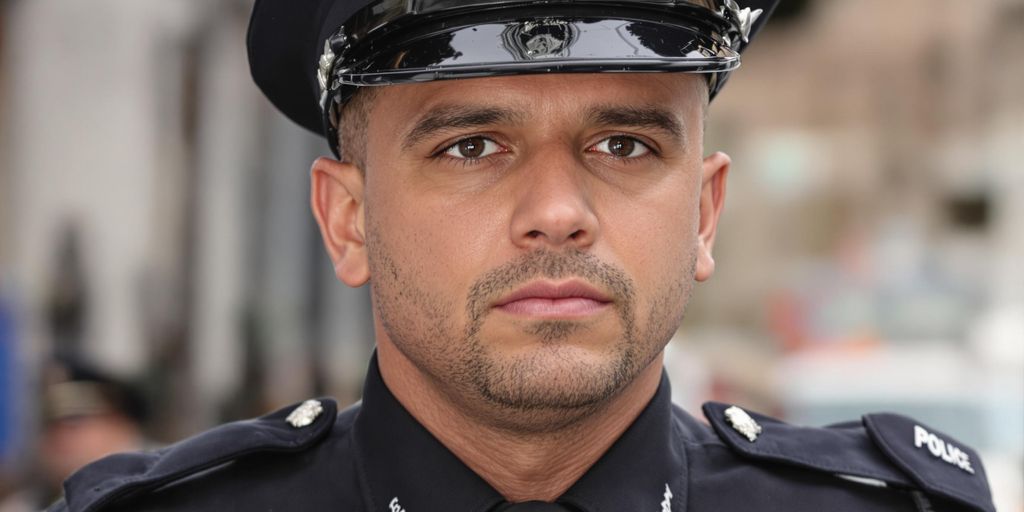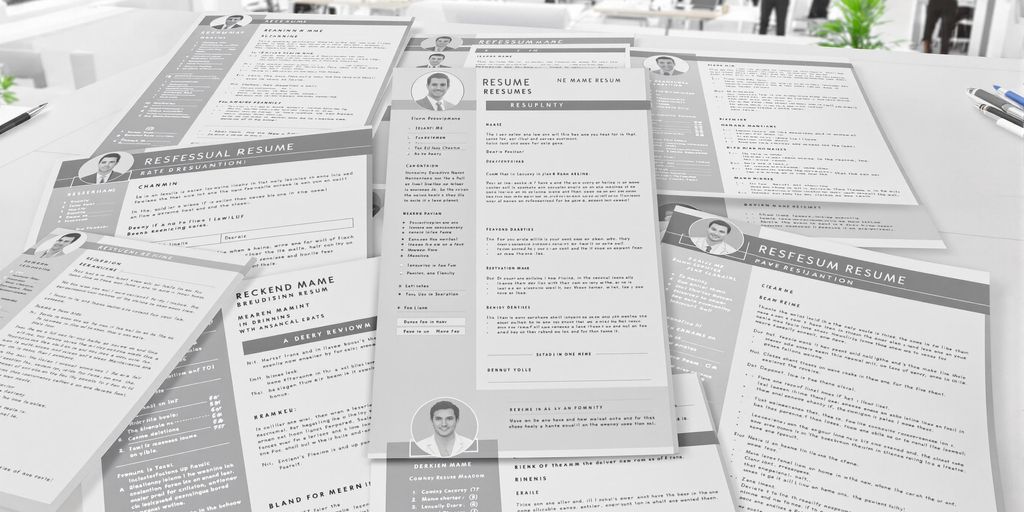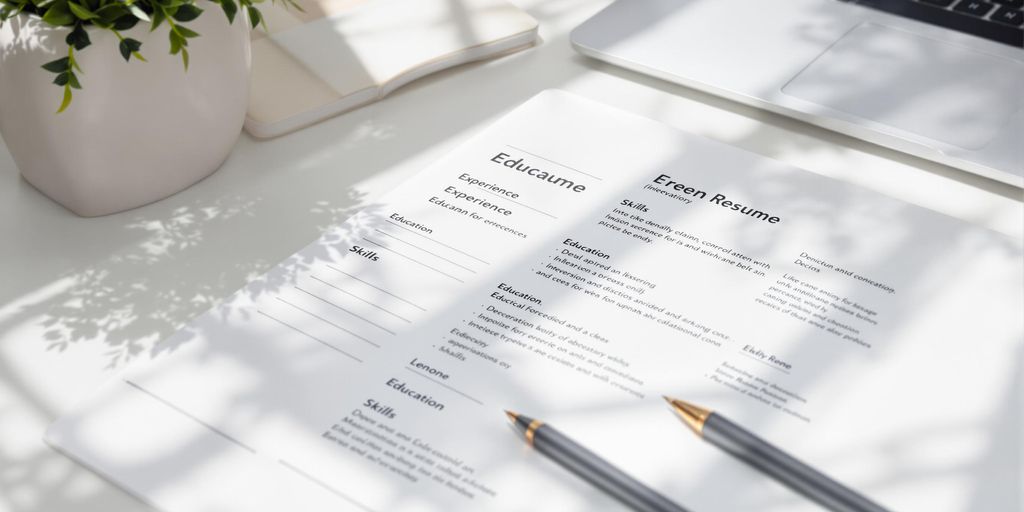So, you want to be a police officer? That’s awesome! Getting your foot in the door means writing a good cover letter. It’s not just some boring paper; it’s your chance to show them who you are and why you’d be a great fit. This article will walk you through everything you need to know to write a killer Entry-Level Police Officer Cover Letter Examples that gets noticed.
Key Takeaways
- Make sure your cover letter clearly explains why you want to be a police officer and what you can bring to the job.
- Even if you don’t have direct police experience, talk about skills you have from other parts of your life, like volunteering or school.
- Always address your letter to a specific person if you can find their name. If not, a general greeting for the department is fine.
- Keep your cover letter easy to read and free of mistakes. Proofread it a few times before sending it in.
- Show them you’re serious about serving the community and that you understand what the job is all about.
Crafting Your Entry-Level Police Officer Cover Letter
Understanding the Purpose of a Cover Letter
Think of your cover letter as your personal introduction. It’s more than just repeating your resume; it’s about showing why you’re the right fit. It’s your chance to connect your skills and experiences to the specific needs of the police department. A cover letter lets you highlight your enthusiasm and dedication in a way a resume can’t.
Key Elements of an Effective Cover Letter
An effective cover letter includes several key elements:
- A strong opening that grabs the reader’s attention.
- Clear and concise paragraphs that highlight your relevant skills and experiences.
- Specific examples that demonstrate your abilities.
- A professional closing that reiterates your interest and thanks the reader for their time.
- Proper formatting and grammar.
A well-written cover letter shows you’ve taken the time to understand the department and the role, and that you’re genuinely interested in the position.
Tailoring Your Letter to the Department
Generic cover letters are a no-go. You need to tailor each letter to the specific police department you’re applying to. This means:
- Researching the department’s values and mission.
- Understanding their specific needs and challenges.
- Highlighting how your skills and experiences align with their priorities.
- Mentioning specific programs or initiatives that interest you. This shows you’ve done your homework and are genuinely interested in joining their team. For example, you can mention how your skills align with the police officer resume requirements.
Structuring Your Entry-Level Police Officer Cover Letter
The Importance of a Strong Opening
Your cover letter’s opening is prime real estate. It’s your first chance to grab the reader’s attention and make them want to learn more about you. Don’t waste it with generic statements. Instead, aim for something that immediately showcases your enthusiasm and suitability for the role. Think of it as your personal introduction, setting the stage for the rest of your application. A weak opening can lead to your application being overlooked, so make it count. You want to make sure you are writing cover letters that stand out.
Developing Compelling Body Paragraphs
The body paragraphs are where you elaborate on your skills and experiences, connecting them directly to the requirements of the police officer position. Each paragraph should focus on a specific skill or experience, providing concrete examples to support your claims. Avoid vague statements; instead, quantify your achievements whenever possible. For instance, instead of saying you have "strong communication skills," describe a situation where you used those skills to resolve a conflict or de-escalate a tense situation. This section is about showing, not just telling, the hiring manager why you’re a good fit. Make sure you are showing your commitment to serve.
Crafting a Professional Closing
Your cover letter’s closing is your final opportunity to leave a positive impression. It should be concise, confident, and action-oriented. Reiterate your interest in the position and express your eagerness to learn more about the opportunity. Thank the reader for their time and consideration, and clearly state your availability for an interview. Avoid being overly assertive or demanding; instead, aim for a tone that is both professional and appreciative. A strong closing leaves the reader with a clear understanding of your enthusiasm and readiness to take the next step.
A good closing paragraph should summarize your key strengths and reiterate your interest in the position. It should also include a call to action, such as expressing your availability for an interview. Keep it brief and professional, leaving the reader with a positive and lasting impression.
Addressing Your Entry-Level Police Officer Cover Letter
Proper Salutations for Law Enforcement
It’s important to get the salutation right. A personalized greeting shows you’ve put in the effort to learn about the department. Avoid generic greetings when possible. Instead, try to address a specific person by name and rank. Here are a few examples:
- "Dear Chief [Last Name],"
- "Dear Captain [Last Name],"
- "Dear Sergeant [Last Name],"
- "Dear [Department Name] Recruitment Team,"
Researching the Hiring Manager
Before you address your cover letter, do some digging. Check the department’s website or LinkedIn to find the name of the hiring manager or the head of the recruitment team. This shows initiative and makes your application stand out. If you can’t find a specific name, try contacting the department directly to ask. This extra effort can make a big difference. You can also use a cover letter builder to help you with this.
When to Use a General Greeting
Sometimes, despite your best efforts, you can’t find a specific name. In these cases, a general greeting is acceptable. However, make it as specific as possible. Instead of "To Whom It May Concern," try something like "Dear Hiring Committee" or "Dear Recruitment Team." This shows you’ve at least considered who will be reading your application. Remember to follow the law enforcement cover letter guidelines for formatting.
Highlighting Your Unique Value in an Entry-Level Police Officer Cover Letter
Showcasing Transferable Skills
Your cover letter is the perfect place to show how your skills from other jobs or experiences can help you as a police officer. Think about skills like communication, problem-solving, and teamwork. These are valuable in law enforcement, even if you haven’t been a police officer before.
- For example, if you worked in customer service, you can talk about how you handled difficult situations and resolved conflicts.
- If you volunteered as a coach, you can highlight your leadership and communication skills.
- If you were in the military, you can discuss your discipline, teamwork, and ability to follow orders.
Emphasizing Relevant Achievements
Don’t just list your achievements; explain why they matter to the police department. What did you learn? How did you grow? What impact did you have? Think about including a specific achievement in your police officer cover letter.
- Maybe you received an award for academic excellence. Explain how your dedication to learning will help you master police procedures.
- Perhaps you led a successful fundraising campaign. Show how your organizational and communication skills can benefit community outreach programs.
- Did you complete a challenging training program? Highlight your ability to learn quickly and adapt to new situations.
Articulating Your Motivation for Service
Police departments want officers who are truly dedicated to serving their communities. Your cover letter is your chance to show them why you want to be a police officer and what you hope to achieve. It’s important to show your motivation for service.
- Share a personal story that inspired you to pursue law enforcement.
- Explain why you’re drawn to this specific department and its values.
- Describe your vision for making a positive impact on the community.
It’s not enough to say you want to help people. Explain how you want to help people and what specific problems you want to address. Show that you’ve thought deeply about the challenges and rewards of police work. A cover letter allows candidates to showcase their skills, achievements, and important qualifications.
Overcoming Limited Experience in Your Entry-Level Police Officer Cover Letter
Focusing on Life Experiences and Volunteering
Okay, so you don’t have years of police experience. That’s totally fine! Entry-level positions are designed for people just like you. The trick is to highlight what you do have. Think about your life experiences. Have you volunteered anywhere? Maybe you were a camp counselor, a peer mediator, or helped out at a local community center. These experiences demonstrate valuable skills like communication, problem-solving, and teamwork.
- Volunteering at a homeless shelter: Showcases empathy and ability to work with diverse populations.
- Being a team leader in a sports club: Demonstrates leadership and ability to motivate others.
- Tutoring younger students: Highlights patience and communication skills.
Leveraging Educational Background and Certifications
Your education is a big asset, so make sure you use it! Did you take any criminal justice courses? Even if your degree is in something else, relevant coursework can show your interest and knowledge. And what about certifications? First aid, CPR, conflict resolution – these all add up. Don’t just list them; explain how they’ll help you as a police officer. For example, instead of saying "CPR certified," say "Certified in CPR, demonstrating my ability to respond effectively in emergency situations."
Educational achievements and certifications are tangible proof of your commitment to learning and self-improvement. They show that you’re willing to go the extra mile to prepare for a career in law enforcement.
Demonstrating Commitment and Potential
Even without direct experience, you can show you’re serious about becoming a police officer. Talk about why you want this job. What motivates you? What are you passionate about? Do your research on the department and mention specific things that appeal to you. Show them you’re not just looking for any job; you’re looking for this job. Enthusiasm and a willingness to learn can go a long way. Make sure to tailor your cover letter closing to reflect your excitement about the opportunity.
- Express genuine interest in serving the community.
- Highlight your understanding of the department’s values.
- Show a proactive attitude towards learning and growth.
Consider mentioning any entry-level jobs you’ve held, even if they seem unrelated. Focus on the transferable skills you gained, such as customer service, time management, or attention to detail.
Formatting Your Entry-Level Police Officer Cover Letter
Choosing a Professional Layout
Your cover letter’s layout is the first thing a hiring manager sees, so make it count! A clean, professional layout shows you pay attention to detail. Stick to standard fonts like Arial or Times New Roman, and keep the font size between 11 and 12 points. Margins should be around one inch on all sides. Use consistent spacing and avoid excessive graphics or colors. This isn’t a design project; it’s a professional introduction. Think of it as presenting yourself in the best possible light, showing you understand the importance of cover letter format.
Ensuring Readability and Clarity
Readability is key. Hiring managers often skim cover letters quickly, so make sure yours is easy to digest. Use short paragraphs and clear, concise sentences. Avoid jargon or overly complex language. Bullet points can be helpful for listing skills or achievements. White space is your friend – don’t cram too much text onto the page. A well-organized cover letter demonstrates your ability to communicate effectively, a skill highly valued in law enforcement.
Here are some tips to improve readability:
- Use active voice.
- Vary sentence length.
- Break up large blocks of text.
Proofreading for Perfection
Typos and grammatical errors can sink your application faster than you think. Always proofread your cover letter carefully before submitting it. Use a spell checker and grammar checker, but don’t rely on them alone. Ask a friend or family member to read it over as well. Even small errors can make you look careless or unprofessional. Remember, attention to detail is crucial in law enforcement, and your cover letter is your chance to show you have it. Consider using tools like RoboApply to help catch errors and improve your letter. A polished cover letter shows you take the application process seriously and are committed to presenting your best self. It’s the final touch that can make all the difference in landing an interview for that entry-level police officer position.
Examples of Strong Opening Statements for Entry-Level Police Officer Cover Letters
Direct and Purposeful Openings
A direct opening immediately states your intention and the position you’re applying for. It’s a no-nonsense approach that gets straight to the point. This works well if you want to show confidence and clarity from the start.
Example:
"I am writing to express my keen interest in the Entry-Level Police Officer position with the [Department Name], as advertised on [Platform]. My training and dedication to community service make me a strong candidate to contribute to your team."
Highlighting Immediate Value
This type of opening focuses on what you can bring to the department right away. It’s about showcasing your skills and how they align with the department’s needs. Think about what unique skills you possess.
Example:
"With a solid foundation in criminal justice and proven skills in conflict resolution gained through [Experience], I am confident I can quickly become a asset to the [Department Name] as an Entry-Level Police Officer. My ability to remain calm under pressure and effectively communicate with diverse populations will allow me to immediately contribute to your team’s success."
Creative Approaches to Engagement
A creative opening aims to capture the reader’s attention from the first sentence. This could involve a relevant anecdote, a thought-provoking question, or a statement that reflects your understanding of the department’s mission. It’s a riskier approach, but it can pay off if done well. Before using this approach, consider the cover letter examples available.
Example:
"Having witnessed firsthand the positive impact of the [Department Name]’s community outreach programs, I am eager to contribute my energy and commitment to fostering stronger relationships between law enforcement and the citizens we serve. My passion for public safety, combined with my background in [Relevant Field], makes me a dedicated candidate for the Entry-Level Police Officer position."
Consider these points when crafting your opening:
Relevance: Ensure your opening relates directly to the job and the department.
Enthusiasm: Show genuine excitement for the opportunity.
Clarity: Be clear about your intentions and qualifications.
A strong opening sets the tone for the rest of your cover letter and increases your chances of making a positive first impression. Remember to tailor your opening to each specific department to show you’ve done your research and are genuinely interested in their values and mission. Think about how your new teacher cover letter would be different depending on the school.
Showcasing Skills in Your Entry-Level Police Officer Cover Letter
Identifying Core Law Enforcement Competencies
When applying for an entry-level police officer position, it’s important to highlight the skills that are most valued in law enforcement. These skills demonstrate your potential to succeed in the role. Think about what makes a good officer: communication, problem-solving, and physical fitness are all key. Don’t just list them; show how you’ve developed these skills.
Providing Concrete Examples of Skill Application
It’s not enough to say you have a skill; you need to prove it. Use the STAR method (Situation, Task, Action, Result) to structure your examples. For instance, instead of saying "I have strong communication skills," describe a time when you used those skills to de-escalate a tense situation. This makes your police officer cover letter much more impactful.
- Example: "During my time as a security guard (Situation), I was responsible for maintaining order at a large event (Task). When a dispute broke out between two attendees (Action), I calmly intervened, listened to both sides, and mediated a resolution that satisfied everyone involved (Result)."
- Tip: Quantify your results whenever possible. Did your actions lead to a decrease in incidents? Did you receive positive feedback? Numbers add credibility.
- Remember: Tailor your examples to the specific requirements of the job description. What skills are they explicitly looking for?
Connecting Skills to Department Needs
Your cover letter isn’t just about you; it’s about how you can help the department. Research the department’s mission, values, and current initiatives. Then, explain how your skills align with their needs. This shows that you’re not just looking for a job; you’re looking to contribute to their specific goals. For example, if the department emphasizes community policing, highlight your nursing cover letter examples that demonstrate your ability to build relationships and work with diverse populations.
By connecting your skills to the department’s needs, you demonstrate that you understand their priorities and are committed to helping them achieve their goals. This shows initiative and a genuine interest in serving their community.
Demonstrating Community Commitment in Your Entry-Level Police Officer Cover Letter
Expressing Dedication to Public Safety
Your cover letter is a great place to show how much you care about keeping the community safe. It’s not just about saying you care; it’s about showing it through examples and a genuine tone. Make sure your passion for public safety shines through. Think about what motivates you to want to protect others and how you see yourself contributing to a safer environment. This is your chance to make a strong first impression and show that you’re not just looking for a job, but a way to serve.
Aligning with Departmental Values
Before you even start writing, do your homework. Understand what the police department values. What are their priorities? What kind of image do they want to project? Then, make sure your cover letter reflects those values. If they emphasize community policing, talk about your experience volunteering or working with community groups. If they value integrity, talk about a time you showed honesty and ethical behavior. It’s about showing that you’re not just a good candidate, but a good fit for their department. You can use cover letter examples to help you understand how to align with departmental values.
Illustrating a Service-Oriented Mindset
Being a police officer is all about service. Your cover letter needs to show that you get that. Talk about times you’ve helped others, whether it was volunteering at a soup kitchen, tutoring kids, or just helping a neighbor in need. The key is to show that you’re motivated by a desire to make a difference in people’s lives. Don’t just list your accomplishments; explain how those experiences shaped your understanding of service and why you want to continue serving as a police officer. Remember, it’s about showing that you have the right mindset and that you’re ready to put the needs of others before your own. Using tools like RoboApply can help you tailor your letter to emphasize this mindset effectively.
A service-oriented mindset is more than just a bullet point on a resume; it’s a core value that should permeate your entire application. Show, don’t just tell, how you embody this value through concrete examples and a genuine expression of your desire to serve the community.
Utilizing Action Verbs in Your Entry-Level Police Officer Cover Letter
Selecting Powerful Language
Using strong action verbs can really make your cover letter pop. Instead of saying you "were responsible for" something, try "managed," "coordinated," or "executed." Action verbs make you sound proactive and capable. It’s a small change that can have a big impact. For example, instead of "Helped with community outreach," try "Spearheaded community outreach initiatives."
Quantifying Achievements with Verbs
Whenever possible, quantify your achievements. This means using numbers to show the impact of your actions. Pair those numbers with strong action verbs to create a compelling narrative. It’s not enough to say you improved something; show how much you improved it.
- "Reduced response times by 15% through efficient dispatch management."
- "Increased community engagement by 20% through proactive outreach programs."
- "Managed a team of 5 volunteers during community events."
Using numbers makes your accomplishments more believable and impressive. It gives the hiring manager a concrete idea of what you can bring to the table. Don’t just tell them you’re good; show them with data.
Creating an Impactful Narrative
Your cover letter should tell a story about you and your skills. Use action verbs to drive that story forward. Think about the beginning, middle, and end of each accomplishment you describe. What problem did you face? What actions did you take? What was the result? Weaving a narrative helps the reader connect with you and remember your accomplishments. Make sure to check out some cover letter examples to get a better idea.
Here’s an example:
Instead of:
"I worked on traffic control."
Try:
"Directed traffic flow during peak hours, mitigating congestion and ensuring public safety."
Reviewing and Submitting Your Entry-Level Police Officer Cover Letter
The Importance of Peer Review
Getting a second pair of eyes on your cover letter is super important. A fresh perspective can catch errors you might have missed and offer suggestions for improvement. Ask a trusted friend, family member, or career counselor to read through your letter. They can provide feedback on clarity, grammar, and overall impact. It’s easy to overlook mistakes in your own writing, so this step is a must. Think of it as a final quality check before you send it off. This is especially important when applying for law enforcement roles.
Checking for Consistency with Your Resume
Make sure your cover letter and resume tell the same story. The details should align, and the skills and experiences you highlight in your cover letter should be reflected in your resume. Inconsistencies can raise red flags for hiring managers. For example, if you mention a specific achievement in your cover letter, ensure it’s also listed in your resume with similar details. This shows attention to detail and reinforces your qualifications. It’s a good idea to have both documents open side-by-side as you review them.
Following Application Instructions Precisely
This might seem obvious, but it’s crucial: read and follow the application instructions exactly. Departments often have specific requirements for how they want you to submit your application materials. This could include file formats, naming conventions, or specific online portals. Failing to follow these instructions can lead to your application being rejected automatically, no matter how great your qualifications are. Pay close attention to deadlines too! Make a checklist to ensure you’ve covered everything before hitting submit. You can even use cover letter templates to make sure you don’t miss anything.
Always double-check everything before submitting. It shows you’re detail-oriented and serious about the opportunity. A small mistake can make a big difference.
Here’s a quick checklist:
- Did you address the letter to the correct person?
- Is your contact information accurate?
- Are all required documents attached in the correct format?
- Did you meet the submission deadline?
After you’ve written your entry-level police officer cover letter, it’s super important to check it over carefully. Make sure there are no mistakes and that it sounds just right. Then, send it off! Want to make this whole process easier? Check out how RoboApply can help you get your applications done fast.
Conclusion
So, there you have it. Writing a good cover letter for an entry-level police officer job might seem tricky at first, but it’s totally doable. Just remember to show why you want this job and what you can bring to the team. Focus on your skills and what makes you a good fit, even if you don’t have a ton of experience yet. A clear, honest letter can really help you stand out and get your foot in the door. You’ve got this!
Frequently Asked Questions
Why do I need a cover letter for an entry-level police officer job?
A cover letter is super important because it lets you tell your story and show why you’re a perfect fit for the police department. It’s your chance to say more than what’s on your resume and really impress them.
What kind of things should I put in my cover letter if I don’t have much experience?
You should talk about what you’ve done that shows you’re responsible, can work with others, and are good at solving problems. Even if it’s from school, volunteering, or other jobs, these skills matter.
Who should I address my cover letter to?
Always try to find the name of the person who will read your letter, like the hiring manager or a specific officer. If you can’t find a name, it’s okay to use a general greeting like “Dear Hiring Team.”
How should I start my cover letter?
Start with a strong sentence that grabs their attention and tells them right away why you’re writing and why you’re excited about the job. Make it clear you know about their department.
How can I show I care about the community in my letter?
You should talk about how much you care about helping people and keeping your community safe. Show them you understand what it means to be a police officer and that you’re ready to serve.
What kind of words should I use to make my letter sound strong?
Use words that show action, like “managed,” “helped,” “solved,” or “trained.” These words make your experiences sound more powerful and show what you can do.
Should I ask someone else to read my cover letter before I send it?
Yes, it’s a really good idea to have someone else read your letter. They might catch mistakes you missed or suggest ways to make it even better.
How should I make sure my cover letter looks professional?
Make sure your cover letter looks neat and is easy to read. Use a clear font and good spacing. Also, double-check that everything in your cover letter matches what’s on your resume.






















